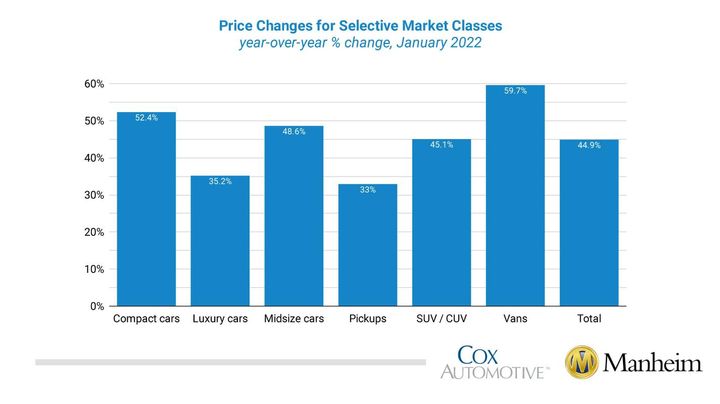
The vans market class saw the highest price increases at 60%.
Source: Cox Automotive
Wholesale used-vehicle prices (on a mix-, mileage-, and seasonally adjusted basis) were mostly unchanged in January compared to December, Cox Automotive reported Feb. 7.
The Manheim Used Vehicle Value Index increased slightly to 236.3, a 45% increase from a year ago. The non-adjusted price change in January was a decline of 0.9% compared to December, leaving the unadjusted average price up 41% year over year.
Manheim Market Report (MMR) values saw weekly price decreases in January that accelerated slightly in the final full week of the month. Over the full four weeks in the month, the Three-Year-Old Index declined a net 2.9%. Over the month of January, daily MMR Retention, which is the average difference in price relative to current MMR, averaged 98%, which meant that market prices were behind MMR values. The average daily sales conversion rate also declined in the month to 50%, which was below normal for the time of year.
For example, the sales conversion rate averaged 51.5% in January 2019. The lower conversion rate indicates that the month saw buyers with slightly more bargaining power for this time of year, and as a result, most vehicles showed price depreciation. However, price patterns in the month varied by vehicle age and segment. Older vehicles were more likely to see price stability, while younger vehicles tended to see larger declines.
On a year-over-year basis, all major market segments saw seasonally adjusted price gains in January. Vans had the largest year-over-year performance, followed by compact cars, while the pickup and luxury car segments lagged the overall market. On a month-over-month basis, the segment performance was more mixed as compact cars, luxury cars, and pickups declined, while midsize cars, sports cars, and SUVs saw gains.
Vehicle Sales Start the Year Slow
Total used-vehicle sales were down 0.8% year over year in January, according to Cox Automotive estimates. Cox estimates the January used SAAR to be 39 million, down from 39.3 million last January and down from December’s revised 40.8 million SAAR. The January used retail SAAR estimate is 22 million, up from 21.5 million last year but down slightly from 22.3 million in December. Using estimates of used retail days’ supply based on vAuto data, December ended at 51 days, which is lower than how 2020 ended at 54 days. Leveraging Manheim sales and inventory data, we estimate that wholesale supply ended December at 26 days, which is lower than how 2020 ended at 32 days.
January total new light vehicle sales were down 10% year over year, with the same number of selling days compared to January 2021. Month over month, January new-vehicle sales were down 18%. The January SAAR came in at 15 million, a 10% decline from last year’s 16.8 million. January 2020 had a 16.9 million rate.
Combined sales into large rental, commercial, and government buyers were down 36% year over year in January. Sales into rental declined 61% year over year. Sales into commercial increased 4% year over year, while sales into government declined 23%. Including an estimate for fleet deliveries into the dealer and manufacturer channel, Cox estimates the remaining retail sales were down 6% year over year in January, leading to an estimated retail SAAR of 13.2 million, which was down from 14.1 million last January but up from December’s 11 million rate.
Rental Risk Mileage Decreases
The average price for rental risk units sold at auction in January was up 39% year over year. Rental risk prices were up 4% compared to December. Average mileage for rental risk units in January (at 60,000 miles) was up 21% compared to a year ago and down 12% month over month.
Consumer Sentiment Fell in January
Consumer Confidence according to the Conference Board declined 1.2% in January, erasing some of December’s 2.9% gain. The increase left confidence down 14.2% compared to February 2020. The underlying measures of present situation and future expectations moved in opposite directions as present situation declined but future expectations improved. Plans to purchase a vehicle in the next six months increased to the highest level in six months and was higher than a year ago. Plans to purchase a home also improved to a record level. The sentiment index from the University of Michigan declined 4.8% in January as both current conditions and expectations declined. The Michigan reading was the lowest since November 2011. The Morning Consult daily index of consumer sentiment declined 2.1% in January, leaving it down 3.3% year over year and down 24.1% from Feb. 29, 2020.
Originally posted on Vehicle Remarketing
